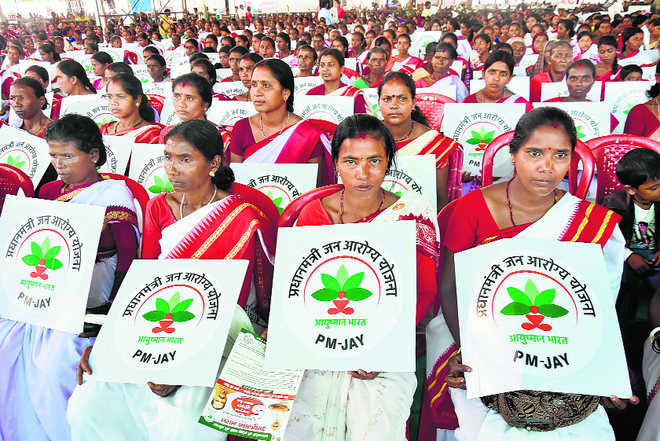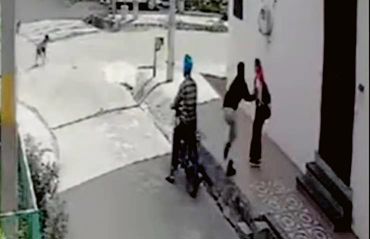
A plan in place: The PMJAY, an ambitious healthcare scheme, aims to prevent 70 million Indians from slipping below the poverty line annually due to catastrophic health expenses. PTI
Aditi Tandon in New Delhi
Much is at stake for the BJP-led NDA government as it keeps a close watch on the progress of Pradhan Mantri Jan Aarogya Yojna (PMJAY), the world’s largest health-protection scheme rolled out nationally last Sunday. Launched by Prime Minister Narendra Modi from Jharkhand’s Ranchi on the eve of 2019 Lok Sabha elections, the scheme aims to finance hospitalisation of 10.74 crore underprivileged families (50 crore people) to the extent of Rs 5 lakh annually.
These families are the ones defined as “poor and vulnerable” in the Rural Development Ministry’s Socio Economic Caste Census, published in 2011 and updated in 2015. To this extent, PMJAY is an entitlement-based plan that won’t invite enrolments and will have a pre-determined set of beneficiaries. The scale of the plan is massive as it seeks to cover 40 per cent of the national population promising them cashless, paperless and portable access to hospitalisation through a network of empanelled government and private hospitals.
The hospitals are not allowed to charge patients for any procedure. The arrangement is simple — the Centre and states (in the ratio of 60:40) will reimburse hospitals the cost incurred on treating beneficiaries. Exactly 1,350 medical packages across 23 specialties (oncology, ophthalmology, urology, general surgery and orthopaedics included) have been identified and their package rates fixed. Hospitals are bound by these rates and are allowed to raise claims based on the packages the government has decided in consultation with various stakeholders.
Execution and results
Within a week of its launch, PMJAY has started to deliver. As of September 28, 18,258 beneficiaries have sought hospitalisation under the plan and healthcare providers have submitted 13,108 claims to state governments for reimbursement. The maximum claims came from Gujarat (5,777), followed by Tamil Nadu (3,837), Chhattisgarh (2,193) and West Bengal (1,198).
The Tribune has learnt that these claims involve procedures that cost hospitals Rs 25.22 crore with ophthalmology emerging the top sought specialty at 731 claims. As the scheme progresses, timely settlement of hospital claims will be its top challenge, lest hospitals quit for want of money. However, Dinesh Arora, Deputy CEO of Ayushman Bharat, the banner body for PMJAY, says the government has created systems for timely settlement of hospital claims.
State health societies have been mandated to clear claims within 15 days unless a fraud is suspected, in which case the deadline is one month. “If the claims are not settled within 15 days, the state will invite weekly penalty amounting to one per cent of the cost involved in the claim the hospital has submitted,” Arora says.
Out of 30 states that have signed MoUs with the Centre to run PMJAY, only seven have opted for insurance model, while the rest have decided to run the scheme through state health societies. The trust model is that of CGHS. Identification of beneficiaries and stabilisation of IT platforms, developed to run the plan, pose equally pressing challenges to PMJAY managers. Every beneficiary must have, what the Centre calls, a “golden card” to avail of cashless services. In the first five days of the scheme rollout, the government has issued golden cards to 33,529 persons. PMJAY is meant only for hospitalisations. It does not cover the cost of OPD care.
Who is a golden card holder?
Ayushman Bharat CEO Indu Bhushan explains, “A golden card holder is the beneficiary whose data points — QR code and identification — have been matched with PMJAY’s IT systems and one who is ready to avail free services at the hospital. In the first stage of plan’s rollout, 10 crore beneficiary families under the SECC through village-level drives have been identified. Then, we sent each family a letter bearing their QR code. In the third stage, beneficiaries will get golden cards once they reach the hospital for care, approach the Aarogya Mitra stationed at each hospital, match their QR codes with identification cards to authenticate themselves with the name registered in the software. Once that is done, the beneficiary gets the golden card and is ready to avail of the service.”
But what if a patient’s access to treatment is delayed on account of the above mentioned authentication procedures? Ayushman Bharat managers say that won’t happen. Emergency protocols under the PMJAY say the empanelled hospitals are dutybound to treat emergency patients without waiting for authentications.
Check for flaws
As many as 97 fraud alerts have been installed in the PMJAY software, including “indiscriminate procedures” or “unexplained patient visits to a certain facility”. Dinesh Arora explains, “We will have cause for suspicion if a patient visits a certain hospital repeatedly when there is another hospital close to his residence. In this case, middlemen might be herding patients to a given facility for some illegal benefits. It would also be unnatural for one hospital to submit a large number of claims.”
Hospitals perpetrating frauds will meet with severe penalties, including de-empanelment and blacklisting, besides financial fines that go up to 16 times the cost of procedures for which they submitted inflated or false claims. That said, the stabilisation of PMJAY softwares remains a cause of concern for the Centre. The reason government launched a pilot in 22 states to test these softwares before the September 23 launch. It was to prevent the GST-type glitches.
The Centre is now training Aarogya Mitras to be stationed at every hospital empanelled under the PMJAY to help beneficiaries access care through IT systems. So far, 14,000 Aarogya Mitras have been trained in these softwares. More are under training.
So far, 27,000 hospitals have already applied for empanelment under the scheme and 13,273 have met the criteria. Of these, 7,097 are private and the rest are government hospitals. Medanta, Gurugram and Apollo, Tamil Nadu are among private facilities empanelled with the PMJAY.
The idea behind the ambitious plan is to prevent 70 million Indians from slipping below the poverty line annually due to catastrophic health expenses.
At stake is the health of an entire nation.
Why PMJAY: The latest National Sample Survey Organization (NSSO) found 85.9 per cent rural households and 82 per cent of urban households had no access to healthcare insurance/assurance. Catastrophic healthcare-related expenditure pushed families into debt, with more than 24 per cent households in rural India and 18 per cent population in urban areas meeting healthcare expenses through some form of borrowing.
Abstaining states: Delhi, Punjab, Telangana, Odisha, Kerala.
To know more: Visit the website mera.pmjay.gov.in or call 14555 or 1800111565
Package rate includes: Room, bed charges, nursing care, diagnostics, procedure cost and physician fee, consultation and diagnostics pre-hospitalisation, two-week medicine, stitch removal, follow-up consultancy for two weeks post-discharge
The procedures covered: One beneficiary family (average size five members) can avail of cashless hospitalisation up to Rs 5 lakh annually for any of the 1,350 medical packages covered under 23 specialties.
Breakup of packages — General surgery (253 packages covered), orthopaedics (101), cardiology (38), cardiovascular surgery (21), ophthalmology (42), ENT (94), urology (161), obstetrics and gynaecology (73), paediatric medicine (100), neonatal care 911), paediatric surgery (35), paediatric cancers 912), medical packages (69), neurosurgery (82), intervention neuro-radiology (12), oncology (112), mental health disorders (17) and emergency packages (4)
WHO endorses PMJAY
WHO Director-General Tedros Adhanom Ghebreyesus recently called PMJAY a “turning point” and a “bold, ambitious and courageous move”. He said, “As a nation, India has changed the way it plans things. India has decided to stretch itself to a breaking point to succeed in the health sector and that’s what I call a plan. I have always felt that the best way to plan is to target blanket coverage rather than piecemeal coverage. A plan that’s easy to achieve is not a plan.”



























